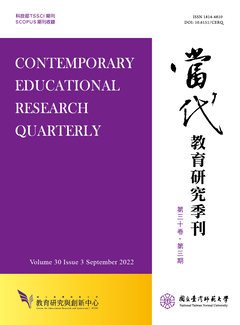

Elementary schools and junior high schools have employed professional guidance staff for more than 20 years. Psychologists were first invited to help school guidance programs in 1997, and the government established Student Counseling Centers and hired school psychologists to work in the system in 2014. After the Student Guidance Law passed, standards and rules for the selection of school psychologists and social workers on campus were also set. More recently, the policy requires that full-time school counselors are hired. These three different professions form a collaborative team on campuses. While the policy has transformed and enhanced school guidance work, there remain four important issues facing school psychologists, which are: professional training (Education), abilities assessment (Examination), practice works (Application), and on-the-job professional development (Sustainability).
This article discusses both the present experience of school psychologists and the ideal experience of school psychologists with three different aims. First, we aim to describe the professional difficulties and practice essentials that school psychologists who work in elementary and junior high schools face. We review the situation in Taiwan and compare it to western perspectives of school psychologists’ professional development. Then, we evaluate the current challenges. Second, we present an analysis of “the curriculum of a school psychologist training program” which examines the training process and explores the framework and elements of school (including both counseling and clinical psychology programs) with the ten domains of school psychologist training courses recommended by the National Association of School Psychologists (NASP). The results indicate that the ratio of “Interventions & Mental Health Services to Develop Social & Life Skills” was highest at 54.70%, followed by the “Interventions & Instructional Support to Develop Academic Skills” (13.45%), and “Research & Program Evaluation” (13.89%). The ratios of the remaining seven components were all less than 5%, with “Consultation & Collaboration” (0.22%) and “Diversity in Development & Learning” (0.11%) closest to zero. Furthermore, we compared the ratio of the ten domains in counseling and clinical psychology training programs. Within counseling psychology training programs, the number of domains “Family-School Collaboration Services” and “School-Wide Practices to Promote Learning” were obviously higher than they were in clinical psychology programs. Within clinical psychology training programs, the number of domains “Interventions and Instructional Support to Develop Academic Skills” and “Data-Based Decision Making and Accountability” were obviously higher than the number of domains in counseling psychology programs. Furthermore, there were a lack of courses about “Diversity in Development and Learning” offered in clinical psychology programs. Third, the article titled “Vision of Training and Professional Development” constructs and reflects on some possible identities and positions for a school psychologist in Taiwan through a systematic review. Vision of training and professional development integrates the four important issues in the training process (education, examination, application, and sustainability), the reality of school psychologist development limitations in Taiwan, and the international literature and policies. This article further discusses and provides suggestions for addressing issues related to school psychologists, which includes the training process, resource sharing, policy restructuring, and future research.
Keywords:Clinical psychologist, counseling psychologist, professionals on guidance work, school counseling, school psychologist

This work is licensed under a Creative Commons Attribution-NonCommercial 3.0 Taiwan License.
Center for Educational Research and Innovation, National Tawain Normal University
162, Ho-Ping East Rd, Sec. 1, Taipei, Taiwan | Tel:+886-2-7749-3670 | E-mail: cerecerq@gmail.com
CERI | NTNU | E-mail Alerts | Open Journal System
© 2014 CERI-NTNU
